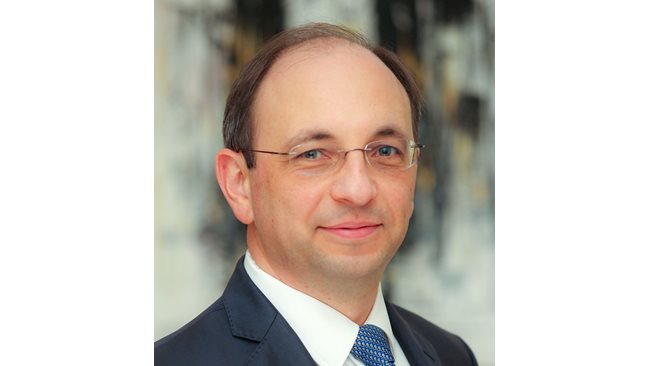Vassilev, whom Slavi liked as prime minister, is an economist with a liberal market understandings
He is persistent and when he sets a goal, nothing can divert him from the path. He is responsible and disciplined and if he makes a commitment, he keeps his word. This is how Nikolay Vassilev is described by people who know him well.
Over the years, Slavi Trifonov’s nominee for prime minister has defended from different positions the ideas of low taxes, zero budget deficit, reduction of external debt, development of capital markets, privatization, concessions, reduction of administrative barriers to business.
He is extremely consistent in his vision of fiscal discipline and lower public spending, defending his theses, whether they are liked by those in power or the public.
Today, 52-year-old economist and financier Nikolai Vassilev
does what on
their own confessions
knows best – manages
investments
It is no coincidence that he holds in his hands the investment portfolios of hundreds of important people from over 20 countries in Western Europe, the United States, Japan, Hong Kong and Singapore.
And in politics so far – 12 years after leaving it, it remains among the record holders in the executive branch in our recent history. He was in two governments – “Saxe-Coburg-Gotha” and “Stanishev”, spending a full 8 years in the Council of Ministers at the head of 3 ministries.
Vassilev was born in 1969 in Varna. In 1994 he graduated in economics and management from the University of Economics in Budapest, in 1995 he received a bachelor’s degree in business administration, finance and economics from the State University of New York, and in 1997 – a master’s degree in international economics and economics. finance at Brendais University (Waltham, USA) and Keio University (Tokyo, Japan).
Since 1999 Nikolay Vassilev holds the prestigious degree of CFA (certified financial analyst) and is
the first Bulgarian
with this degree
Member of the Management Board of the Bulgarian CFA Association.
He speaks English, Hungarian and Russian, has a basic knowledge of French, German and Japanese.
From 1996 to 2001 he worked as an investment banker. During this period he gained extensive experience in investing in global stock markets, working for three multinational companies. He was Senior Vice President at Lazard Capital Markets – London, Associate Director of UBS (former SBC Warburg Dillon Read) at the company’s offices in Tokyo, New York and London, tax consultant at Coopers & Lybrand – Budapest.
20 years ago, Vassilev entered Bulgarian politics with a flying start. The 32-year-old financier at the time was
one of the jupiters,
returned with
families from London
for the king –
together with Milen Velchev, Krassimir Katev, Iliya Lingorski, Pavel Ezekiev. Together with Lyubka Kachakova they were part of the “Bulgarian Easter” – those young and successful Bulgarians abroad, which Ivan Kostov gathered in 2000 to help in the process of our accession to the EU.
In 2001, the Jupiters wrote the economic program of the royal party. They were also united by their friendship with Prince Cyril, with whom they knew from the City of London. Vassilev was even one of the options for prime minister of the NMSS government. This is at a time when Simeon Saxe-Coburg-Gotha is hesitant whether the idea of a king becoming prime minister is not too exotic. If Vassilev had taken office then, he would have equaled the record of Austria’s youngest chancellor, Sebastian Kurz, who took office in 2017 at just 31 years old.
In 2001, Nikolay Vassilev became Deputy Prime Minister and Minister of Economy in Simeon’s government. As his economy minister
personal merit is recognition
for Bulgaria for
functioning market
economy in 2002
(long before Romania). In the same year, Bulgaria ranked 5th among 35 countries in Central and Eastern Europe, the Balkans and Israel in terms of the lowest perception of corruption. The same year marked a remarkable over 6% economic growth in the country.
As soon as he came to power, Vassilev made an impression with the new way of behaving – he shortened the distance with each interlocutor, spoke openly and without detours, listened with a smile to each position, regardless of whether minutes later he would refute it with arguments.
As a politician, he did not suffer from vanity because of his position. On the contrary, he could often be seen walking from Dondukov 1 to his ministry building with a pie and boza for lunch. When he met a new man, who was titled Minister Vassilev, he replied: “Call me Niki.” And he accepted with a sense of humor the nickname that most people gave him because of his glasses – Harry Potter.
It was in 2003
replaced as Minister
of the economy because
conflict with DPS about
the privatization of
Bulgartabac
However, Vassilev was preferred by Saxe-Coburg-Gotha as deputy prime minister and transport minister. He managed to finalize the privatization of BTC, which led to the modernization of the telecommunications market in our country, strengthened Bulgaria Air, the successor of the bankrupt Balkan Airlines. He brought the Varna Shipyard back to bankruptcy and brought it back to life. As Minister of Transport, he made the concessions at the airports in Varna and Bourgas, and BDZ then received modern trains.
In the government of the triple coalition (2005-2009) Vassilev became Minister of State Administration, creating this department from scratch.
He managed to carry out administrative reform, to modernize the system, to conduct trainings, then the foundations of electronic services in Bulgaria were laid.
He signed a controversial contract with Microsoft for legal software for the administration, despite the insistence of the IT industry that officials work with open software such as Linux, for example. Under his leadership, the Operational Program “Administrative Capacity” was established, which with its launch achieved the first place in the whole EU of all operational programs for absorption of funds. He introduced overtime pay for experts in the administration who work on European projects and thus stimulated them. A significant reduction of the central administration has started, but linked to an increase in salaries.
As Minister of Administration, Vassilev managed to fight back
on
euro banknotes
to be written
“Euro” of
Bulgarian language,
although Bulgaria is not yet a member of the euro area. In addition, he introduced a transliteration of the Cyrillic alphabet so that there was a standard for spelling names in Latin letters.
Another of his ideas, initially considered extravagant but realized, was to place large flags at border crossings. At the same time, he went around the checkpoints and corrected mistakes in the English inscriptions, and border guards and customs officers began to call him Monk.
In 2008, his image appeared on a free card, distributed in restaurants along with the inscription in English “Who is this boy?”. And on the back of the card were listed the successes of Vassilev as a minister. It turned out that the publishers of “Fame Cards” themselves chose to make a card with Vassilev – one of the three politicians depicted on the cards.
together with Vladimir Putin
and Nicolas Sarkozy –
the explanation was that
show short stature,
but great men
One of Vassilev’s most amusing blunders is related to “24 hours”. In 2006, it was decided that plastic transparent ballot boxes would be used in the elections so that the section commissions could not put ballots in them in advance. Vassilev bought a huge amount, and “24 hours” asked for one to test whether they are healthy. We broke it, and after the report came out, Vassilev called a special press conference to refute us. But in the course of the demonstration, the minister himself managed to break the ballot box without much effort …
After leaving politics in 2009, he joined Expat Capital, today one of the largest investment companies in Bulgaria.
He is the author of three books – “Energy” (2009), “Menu for Reformers” (2014) and “Career or not” (2018, in Bulgarian, English and Hungarian).
Vassilev is considered well received by almost all parties entering the next parliament. His economic views are liberal, he is an advocate of the most free market. “24 Chasa” was the first to point him out as a favorite for the post of Prime Minister in Trifonov’s cabinet.
– .


